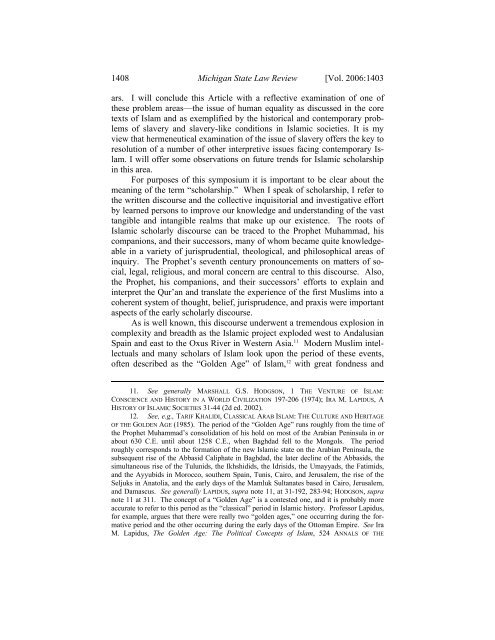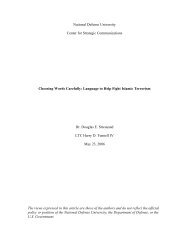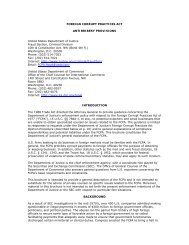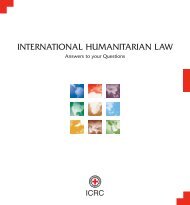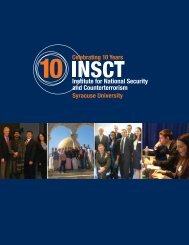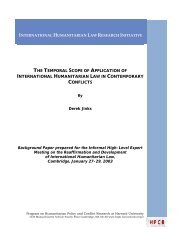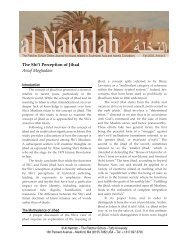some reflection on post-enlightenment qur'anic hermeneutics
some reflection on post-enlightenment qur'anic hermeneutics
some reflection on post-enlightenment qur'anic hermeneutics
Create successful ePaper yourself
Turn your PDF publications into a flip-book with our unique Google optimized e-Paper software.
1408 Michigan State Law Review [Vol. 2006:1403ars. I will c<strong>on</strong>clude this Article with a reflective examinati<strong>on</strong> of <strong>on</strong>e ofthese problem areas—the issue of human equality as discussed in the coretexts of Islam and as exemplified by the historical and c<strong>on</strong>temporary problemsof slavery and slavery-like c<strong>on</strong>diti<strong>on</strong>s in Islamic societies. It is myview that hermeneutical examinati<strong>on</strong> of the issue of slavery offers the key toresoluti<strong>on</strong> of a number of other interpretive issues facing c<strong>on</strong>temporary Islam.I will offer <str<strong>on</strong>g>some</str<strong>on</strong>g> observati<strong>on</strong>s <strong>on</strong> future trends for Islamic scholarshipin this area.For purposes of this symposium it is important to be clear about themeaning of the term “scholarship.” When I speak of scholarship, I refer tothe written discourse and the collective inquisitorial and investigative effortby learned pers<strong>on</strong>s to improve our knowledge and understanding of the vasttangible and intangible realms that make up our existence. The roots ofIslamic scholarly discourse can be traced to the Prophet Muhammad, hiscompani<strong>on</strong>s, and their successors, many of whom became quite knowledgeablein a variety of jurisprudential, theological, and philosophical areas ofinquiry. The Prophet’s seventh century pr<strong>on</strong>ouncements <strong>on</strong> matters of social,legal, religious, and moral c<strong>on</strong>cern are central to this discourse. Also,the Prophet, his compani<strong>on</strong>s, and their successors’ efforts to explain andinterpret the Qur’an and translate the experience of the first Muslims into acoherent system of thought, belief, jurisprudence, and praxis were importantaspects of the early scholarly discourse.As is well known, this discourse underwent a tremendous explosi<strong>on</strong> incomplexity and breadth as the Islamic project exploded west to AndalusianSpain and east to the Oxus River in Western Asia. 11 Modern Muslim intellectualsand many scholars of Islam look up<strong>on</strong> the period of these events,often described as the “Golden Age” of Islam, 12 with great f<strong>on</strong>dness and11. See generally MARSHALL G.S. HODGSON, 1 THE VENTURE OF ISLAM:CONSCIENCE AND HISTORY IN A WORLD CIVILIZATION 197-206 (1974); IRA M. LAPIDUS, AHISTORY OF ISLAMIC SOCIETIES 31-44 (2d ed. 2002).12. See, e.g., TARIF KHALIDI, CLASSICAL ARAB ISLAM: THE CULTURE AND HERITAGEOF THE GOLDEN AGE (1985). The period of the “Golden Age” runs roughly from the time ofthe Prophet Muhammad’s c<strong>on</strong>solidati<strong>on</strong> of his hold <strong>on</strong> most of the Arabian Peninsula in orabout 630 C.E. until about 1258 C.E., when Baghdad fell to the M<strong>on</strong>gols. The periodroughly corresp<strong>on</strong>ds to the formati<strong>on</strong> of the new Islamic state <strong>on</strong> the Arabian Peninsula, thesubsequent rise of the Abbasid Caliphate in Baghdad, the later decline of the Abbasids, thesimultaneous rise of the Tulunids, the Ikhshidids, the Idrisids, the Umayyads, the Fatimids,and the Ayyubids in Morocco, southern Spain, Tunis, Cairo, and Jerusalem, the rise of theSeljuks in Anatolia, and the early days of the Mamluk Sultanates based in Cairo, Jerusalem,and Damascus. See generally LAPIDUS, supra note 11, at 31-192, 283-94; HODGSON, supranote 11 at 311. The c<strong>on</strong>cept of a “Golden Age” is a c<strong>on</strong>tested <strong>on</strong>e, and it is probably moreaccurate to refer to this period as the “classical” period in Islamic history. Professor Lapidus,for example, argues that there were really two “golden ages,” <strong>on</strong>e occurring during the formativeperiod and the other occurring during the early days of the Ottoman Empire. See IraM. Lapidus, The Golden Age: The Political C<strong>on</strong>cepts of Islam, 524 ANNALS OF THE


